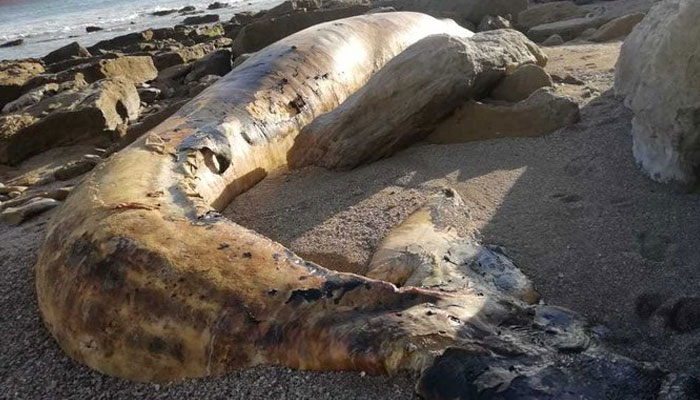59ft Whale got entangled in Fishing Net Washes Ashore in West Bengal. On Monday morning morning around 8.30 am, a huge carcass, around 59ft long and 22ft wide, was found at the southernmost tip of West Bengal. First spotted by local residents of Loyolaganj in South 24-Parganas, a beach 120 km from Kolkata, the carcass had a seemingly fishing net entangled in its tailstock. The death of the sea mammal left the locals and experts puzzled.
A forest official informed The Times of India “The carcass was partly decomposed. It was lifted with a crane and buried under the seashore.” The forest experts suggested that the body could be of a fin whale. However, as fin whales are found in temperate waters, the carcass at Bakkhali could belong to a blue whale, the largest mammal on the planet. Divisional forest officer of South 24 Parganas, Milan Mandal, said his team collected samples from the body for a DNA test by the Zoological Survey of India. He added that the animal will be buried at the beach itself.
Dipani Sutaria, an ecologist studying marine cetaceans in India, said, “A female baleen whale, most likely. The Bay of Bengal is known to have three species of baleen whales — Blue whales, Bryde’s whales and Omura’s whale.” A member of the Marine Mammal Research and Conservation Network of India, Sutaria added that based on the length, the best guess is a blue whale, perhaps a juvenile female. She explained that fin whales avoid tropical and polar waters and semi-enclosed bodies of water. Further suggesting the cause of death, she noted that the tail and fluke has a fishing net tied around them, indicating death due to gear entanglement.
Sutaria, also a member of the Marine Mammal Research and Conservation Network of India, also added, “The tailstock and fluke has a bhekti ‘jaal’ tied around it, suggesting death due to gear entanglement. We could have ascertained the species if tissue samples had been collected and stored in ethanol.” According to her, the Bay of Bengal is known to have three species of baleen whales- the blue whale, Bryde’s whale, and Omura’s whale. These types of whales have plates of whalebone in the mouth for straining plankton from the water.
- Advertisement -
Debal Roy, the chief wildlife warden, mentioned that it can be a fin whale and its presence on the Kolkata beach can result from erratic migration. Its skin samples have been collected, and officials are in contact with the ZSI. Sutaria added that fin whales avoid polar and tropical waters and semi-enclosed bodies of water.
“It can be a fin whale and its presence here can be a result of erratic migration. We have collected its skin samples and spoken to ZSI,” chief wildlife warden, Debal Roy, was quoted as saying by TOI


